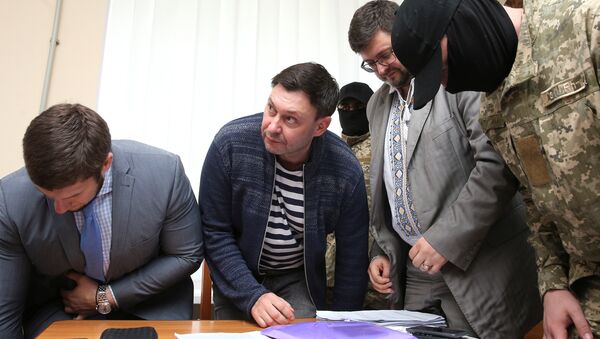Sputnik: How significant is this development?
Mark Sleboda: It’s not really something new or unexpected; we’ve seen escalating theories of information warfare tactics from the Ukrainian government.
The head of RIA Novosti a Ukrainian citizen was just arrested, on grounds of high treason for his reporting work. This is something that the international committee that protects journalists, reporters without borders, all of the journalist NGO’s and watchdogs internationally across the board have condemned and said if Ukraine has such evidence that this man work amounts to high treason against the Ukrainian government, we can presume that he has a political stance different than the government that seized power back in 2014.
They should provide it. I think this is all in the run up for two things really, one the Ukrainian Presidential election, where the so called President of Ukraine now the oligarch Poroshenko, his approval rating is down to about 9%, so he’s got to do something and if preventing his own people from seeing criticism of his regime helps with that. He’s more than likely to clear the media space that might further degrade his already abysmal approval rating by the Ukrainian people, but also he might its very likely in that regard he might restart some military activity the East of his own country, where they are still resisting his seizure of power in 2014.
Sputnik: What will this mean for press freedom?
Mark Sleboda: We have seen a crackdown across the media, both officially and in the grey realm.
Such as the website which was founded by an ex-member of the Ukrainian intelligence services and promoted by Ukraine’s own interior minister, which put the names and addresses of 4500 journalists around the world who have dared report things about the forces that report the Ukrainian regime don’t like. As a result of that is two assassinations, one of a journalist, one of a parliamentarian, so things like this across the board. The only really new information here is that they’ve added RIA Novosti to the banned list, that will be banned across the airwaves but they are also blocking websites.
But unfortunately this is a growing trend not just among countries that have had restricted media in the past, but in countries that uphold themselves as pillars of democracy, freedom of speech and so on. We’ve seen people around the world arrested in the United States for Facebook posts on so called black extremism in recent days. It’s already been several years now since the United Kingdom banned Iran’s Press TV from the country and no one has cried about this in the western press.
Views and opinions expressed in this article are those of Mark Sleboda and do not necessarily reflect those of Sputnik.



